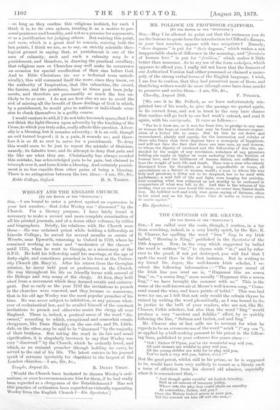MR. POLLOCK ON PROFESSOR CLIFFORD. [To THE EDITOR OF THE
"SPECTATOR:] SIR,—May I be allowed to point out that the sentences you do me the honour to quote from the introduction to Clifford's Essays, in your last number, appear with two misprints P Namely, "these dogmas" is put for "their dogmas," which makes a not inappreciable shade of difference in the meaning; and "founta in of human love" is put for "fruition," which makes it little better than nonsense. As to my use of the form unholpen, which appears to offend you, I really did not know that the framers of our Authorised Version had either possessed or claimed a mono- poly of the strong verbal forms of the English language. I wish, I am free to confess, that they had preserved more of them, and that living writers would do more (though some have done much) to preserve and revive them,—I am, Sir, &c.,
Pumice..
[We owe it to Mr. Pollock, as we have unfortunately mis- printed two of his words, to give the passage we quoted again, in its correct form, and not to trust to the very bare chance that readers will go back to our last week's extract, and read it again, with his corrigenda. It runs as follows:—
" Far be it from me, as it was far from him, to grudge to any man or woman the hope or comfort that may be found in sincere expect- ation of a better life to come. But let this be set down and remembered, plainly and openly, for the instruction and rebuke of those who fancy that their dogmas have a monopoly of happiness, and will not face the fact that there are true men, ay and women, to whom the dignity of manhood and the fellowship of this life, un- dazzled by the magic of any revelation, unholpen of any promises holding out aught as higher or more enduring than the fruition of human love, and the fulfilment of human duties, are sufficient to boar the weight of both life and death. Here was a man who utterly dismissed from his thoughts, as being unprofitable or worse, all speculations on a future or unseen world ; a man to whom life was holy and precious, a thing not to be despised, but to be used with joyfulness ; a soul full of life and light, ever longing for activity, ever counting what was achieved as not worthy to be reckoned in comparison of what was left to do. And this is the witness of his ending, that as never mall loved life more, so never man feared death less. He fulfilled well and truly that great saying of Spinoza, often
in his mind and on his lips : Homo liter de nulla minus quasi de ntorte cogitat." —En. Spectator.]






























 Previous page
Previous page